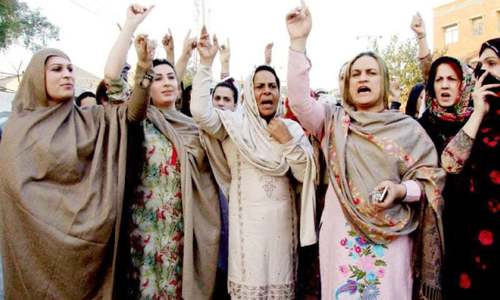KARACHI: The provincial government has decided to formulate an education policy for the transgender community that will cover all formal and non-formal sectors, including their higher education.
Well-placed sources said that the decision to this effect was taken by Sindh Education Minister Syed Sardar Shah after he held a meeting with a delegation of representatives of the province’s transgender community.
The delegation members included executive director of Gender Interactive Alliance (GIA) Bindiya Rana, programme manager Zehrish Khanzadi and activist Shahzadi Rai and Moorat Interactive Society Executive Director Dr Sara Gill.
They said that transgender people would be included in a provincial government’s Alternative Learning Pathway (ALP) programme.
Separate subject on trans people to be included in school curriculum
There are a total of 10,418 transgender persons in the country as per highly controversial 2017 Census, which was also rejected by the transgender community.
The second highest population of transgender people is in Sindh — 2,527 or 24pc — while Punjab stood first with 64.4 per cent of the country’s transgender population or 6,709 people registered in the category.
However, transgender rights group Charity Trans Action Pakistan estimates that there are at least 500,000 transgender people across the country.
Provincial Education Minister Syed Sardar Ali Shah told Dawn that ALP was a recommended path for the out-of-school children and students who could achieve competencies from kindergarten to fifth Grade in just 2.5 years through a non-formal centre using accelerated curriculum under this programme.
He said that the same student could either be mainstreamed in formal public school in sixth grade or can opt for ALP elementary competencies in second level.
Sardar Shah said that the provincial government had recently notified ‘Middle Tech Stream’ which allowed students to attain vocational skills along with conventional subjects of middle class, adding that the ALP programme was being implemented under Directorate of Non Formal Education by provincial school education and literacy department.
He said that Sindh would be the first province to formulate an education policy for transgender people who would be given equal opportunities in education and other sectors.
The education minister said that information regarding transgender people would be included in the academic curriculum to sensitise schoolchildren to transgender people.
He said that the representatives of the transgender community would soon hold meeting with the head of the education department’s curriculum section in this regard.
Zehrish Khanzadi of Gender Interactive Alliance told Dawn that the representatives of transgender people had forwarded three demands to the provincial education minister during their meeting with him.
She said that they asked the education minister to appoint teachers from the transgender community to implement the 0.5 per cent quota announced for the transgender people in provincial government jobs.
Ms Khanzadi said that they had also asked the provincial government to adopt a module of schooling system similar to that in Punjab where a transgender could do matriculation in four years without limit of age.
“Such schools are imparting education to transgender people in Multan and Bahawalpur,” she added.
The third demand, the GIA leader said, was related to inclusion of an introduction to transgender community in the academic curriculum. “We are known in the society by stereotyped profession such as begging, dancing and sex working, which is not true,” she said adding that the transgender people were capable of adopting any profession provided they were given equal opportunities.
Published in Dawn, April 18th, 2022













































Dear visitor, the comments section is undergoing an overhaul and will return soon.